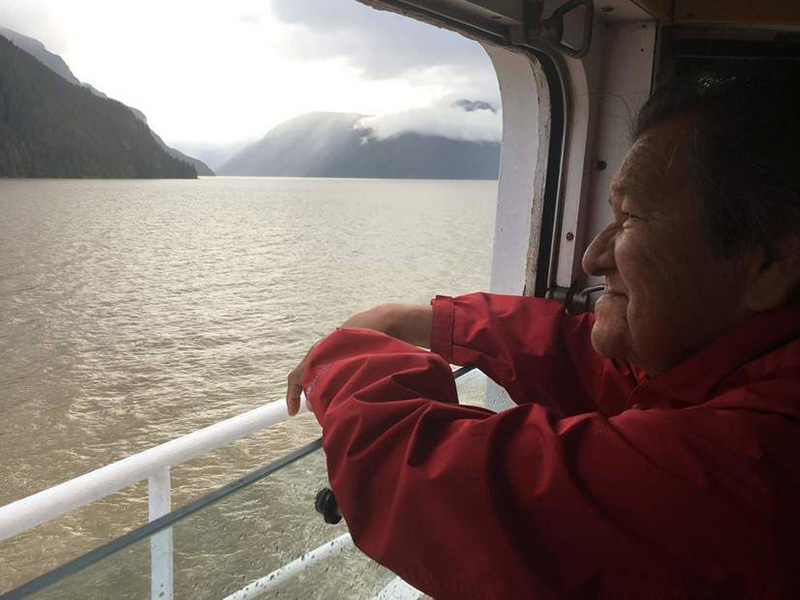Cape Town, South Africa is running out of water.
Compared to Gilford Island, a Kwakwaka’wakw First Nation reserve on B.C.’s temperate rainforest coast, that sounds like an upgrade — at least in Cape Town they still have some water to drink.
Kwakwaka’wakw Hereditary Chief Bill Wilson’s mother is from that reserve. For 50 years, he has watched the water quality decline — first, as logging removed the island’s natural filtration systems, then, as a series of bungled procurements failed to deliver a water filtration system that worked.
“You have young kids breaking out in skin rashes,” says Wilson, the father of federal Justice Minister Jody Wilson-Raybould. “If it was a white community, they would have the best facilities immediately. Because it’s an Indian community nobody gives a shit.”
The David Suzuki Foundation published a new report in February on water issues on First Nations reserves. It found that while some progress has been made to correct the massive shortage of safe water on reserves, there remains a spending gap and a lack of follow-through on many of the measures recommended by governmental and non-governmental agencies.
“I am mother to a five-year-old; I can only imagine the frustration, the heartache, the amount of work it would take to run a household where you can’t put your kid in the bath, where you can’t wash yourself, where you’re hauling water to do dishes,” says Alaya Boisvert, co-author of the new report.
“The fact that people were so shocked that that could happen, it’s important for the Canadian public to realize that there are thousands of people living in more than 100 communities in Canada going without access to clean water, and in some cases already have been for a decade or more.”
According to the Department of Indigenous Services, 81 long-term drinking water advisories were in effect on reserves south of the 60th parallel on Feb. 12; Health Canada reports an additional 26 short-term advisories as of the end of 2017.
The federal government has pledged that they will all be lifted by 2021, but a Parliamentary Budget Office report found the government had over the previous years fallen 30 per cent short of providing enough funding to solve the problem.
The 2018 budget contains $172.6 million more over three years for drinking water on reserves.
“We’re making new investments that will accelerate work to deliver clean, safe drinking water to Indigenous communities ahead of schedule,” Finance Minister Bill Morneau said in his budget speech last week.
“We’ve already lifted 52 long term boil-water advisories, and Mr. Speaker, we’re on track to have all others eliminated by March 2021.”
The federal government doesn’t track water issues in communities north of 60, but in the Northwest Territories, the community of Colville Lake has had a boil-water advisory in place since June 2004 due to an inability to get qualified staff. Departments responsible for water safety in Nunavut and Yukon did not return requests for information on their water advisories.
Like Colville Lake, many of the advisories are due to a lack of trained personnel, and several of the First Nations DeSmog Canada contacted were not desperate to have a new system in place. There are degrees of challenge ranging from the inconvenient to the dire.
In the Tl’azt’en First Nation community of Middle River, residents get drinking water from Fort St. James, about a two-hour round trip away. “Summertime, springtime it gets really bad,” says Mitchell Roberts, a public works attendant. He says residents get frustrated at the lack of safe water.
For Shoal Lake 40 reserve on the Manitoba-Ontario border, the situation is much more serious. The community has had a boil-water advisory for 21 years while the construction of a treatment plant has been an emotional roller coaster ride of promises, delays, plans, alterations and more delays.
Cuyler Cotton is in charge of the water system project on Shoal Lake 40.
“It’s more than frustrating,” he says, breathing a tired sigh into the phone. “Living with this sort of thing on a daily basis; struggling with five-gallon jugs to waltz around when you’re trying to get a glass of juice for your 10-year-old or your grandmother. For 20 fucking years. And being ignored. Being told that your expectations to have equitable treatment like the rest of Canada is too expensive.”
Cotton bristles when asked if he believes the extra $172 million in the new budget will make a difference.
“Fuck right off, build this plant — then we’ll believe you,” he says. “That’s not a question that should be directed at First Nations in Canada. It’s insulting.”
For both Cotton and Wilson, the answer isn’t more help from Ottawa in the form of external contractors and bureaucrats. It’s giving the money over to where it’s actually needed, and letting communities find solutions.
“Only the people living with the problem should be provided with the money,” says Wilson.
“Give them the damn money and they’ll fix their own problems,” echoes Cotton. ![]()
Read more: Indigenous, Health, Rights + Justice, Federal Politics















Tyee Commenting Guidelines
Comments that violate guidelines risk being deleted, and violations may result in a temporary or permanent user ban. Maintain the spirit of good conversation to stay in the discussion.
*Please note The Tyee is not a forum for spreading misinformation about COVID-19, denying its existence or minimizing its risk to public health.
Do:
Do not: